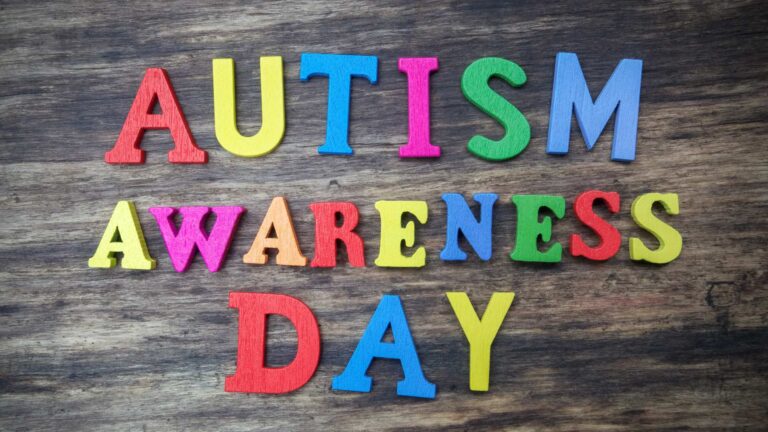Table of Contents
Why do we celebrate World Autism Awareness Day?
Every April 2, the international community comes together to raise awareness about autism spectrum disorder (ASD), promoting acceptance and inclusion of those who are part of the neurodiverse community. The United Nations (UN) General Assembly established this date as World Autism Awareness Day to promote access to adequate resources, improve educational and employment opportunities, and promote an inclusive culture in all areas of society.
According to the World Health Organization (WHO), approximately 1 in 100 children worldwide are on the spectrum. However, recent studies indicate that the number of cases has increased in recent decades, so there is a need to strengthen early detection, access to specialized therapies, and support for families from the early stages of development.
We celebrate this day not only to raise awareness among the population, but also to promote policies that guarantee the rights of people with autism to improve their quality of life. In addition, this day is an opportunity to recognize the talents and abilities of people on the spectrum and reflect on how society can create more accessible and equitable environments for all.
In this article from ABA Centers of Florida, we will discuss the importance of this date, the challenges experienced by people with autism, the neurodiverse community, and how we can contribute to building a better society.
What is Autism, and Why Must it Be Diagnosed Early?
One of the purposes of this day is to inform and raise awareness about the importance of the detection of autism from early childhood because it means promoting the development of communication skills, social exchange, and emotional self-regulation. Some characteristics that may show the presence of ASD in childhood are:
- Lack of eye contact or poor response to their name
- Difficulties in sharing interests or emotions
- Repetitive behaviors or obsessive interests
- Resistance to regular change
- High sensitivity to sounds, textures, or lights
Each child has their own pace of development, but if parents or caregivers observe any of these characteristics, they should consult a specialist. An early diagnosis can be decisive in the adaptation of the children to their environment.

When we talk about autism, we are not referring to a single condition but to a spectrum of experiences and expressions. Each person with ASD has specific strengths and weaknesses, so the support needs that each one requires are different.
History and Current Activities During World Autism Day
In 2007, the United Nations General Assembly proclaimed April 2 as World Autism Awareness Day, with the aim of fostering a greater understanding of ASD, driving inclusive policies, and ensuring better opportunities for people on the spectrum.
Since then, this celebration has become a central aspect of international dialogue, as it highlights the challenges that people with autism and their families face. At the same time, it is an opportunity to reinforce access to necessary therapies and inclusion in the different areas of society, including access to education or employment.
This day is commemorated internationally through awareness campaigns and educational activities. As part of the tradition, numerous cities illuminate the most representative monuments in blue: the Eiffel Tower in Paris, the Empire State Building in New York, and the Sydney Opera House in Australia. In the same way, people organize solidarity walks, popular runs, conferences, workshops, discussion forums, and social media posts with statements of support for the neurodiverse community.
How Can You Support Someone with Autism?

As part of the commemoration of World Autism Awareness Day in 2025, it is essential to highlight the joint work of various organizations, activists, and families that seek to improve the quality of life of people on the autism spectrum. In the United States, multiple non-profit entities, like the Autism Society of America (ASA) and The Autistic Self Advocacy Network (ASAN), develop activities to strengthen understanding of ASD and promote greater inclusion in society.
Likewise, opportunities for people with autism have been increasing, reflecting a change in social and work perception. Recognition that many people on the spectrum can develop successful careers and live autonomously has improved tremendously. Thanks to this, the labor market has begun to open more doors, valuing their unique skills and potential contributions in different sectors.
Building a truly inclusive society is a constant challenge. So, if you want to contribute, you can try these practical points:
- Educate Yourself on Autism: Learning about ASD dispels myths and misconceptions. Understanding sensory sensitivities, communication styles, and cognitive differences can lead to better interactions and authentic inclusion.
- Respect Their Communication: Learn that some individuals with autism may be non-verbal or use alternative communication. Exercise patience, listen attentively, and respect the communication style that the person prefers.
- Create Inclusive Environments: Whether at home, work, or school, work to make your environment more autism-friendly by eliminating sensory triggers such as loud noises or bright lights. Incremental adjustments can lead to a significant change.
- Identify Their Strengths and Interests: Many people with autism may have unique skills and long-standing interests. Supporting or pursuing these interests can give a person with autism confidence and lead to opportunities for personal and professional growth.
ABA Centers of Florida: Helping the Neurodiverse Community
Although more health insurance now covers some autism treatments, the fight for broader and more affordable coverage continues. Many families face difficulties in accessing essential services, which highlights the importance of promoting policies that guarantee the necessary support for their well-being.
At ABA Centers of Florida, we are committed to the quality of life for people with autism and their families. That is why, through ABA (Applied Behavior Analysis) therapy, we offer personalized programs designed to enhance the development of social, communicative, and adaptive skills, promoting autonomy and inclusion in different environments.
Autism is not a disease or something that needs to be “cured”: it is a unique way of perceiving the world and relating to it. Our team of highly trained professionals works closely with each individual, ensuring an approach based on scientific evidence and tailored to each person’s unique needs.
If you need more information about one of our services, please contact us at (772) 773-1975 or schedule a free consultation to explore our autism care services.
South Florida – Help us celebrate with these upcoming events to raise Autism awareness and acceptance!
Thursday, April 10
Florida Panthers Autism Acceptance Game at the Amerant Bank Arena
Time: 7:00 PM (Gates open 6:00 PM)
We will have special on-ice experiences for our kids, including holding the locker room door as the Panthers take the ice and riding the Zamboni!
Sunday, April 13
Miami Marlins Autism Acceptance Game at LoanDepot Park
Time: 1:40 PM (Gates open 12:40 PM)
Memorable on-field experiences for our kids include a chance to be the lineup card delivery person, helping with the base change, and the 7th-inning stretch!
Both events will include access to our Sensory Room on-site, fun gifts just for stopping by to say “hi,” and an exclusive branded giveaway for all attendees! For more information, call (772) 773-1975 today!








